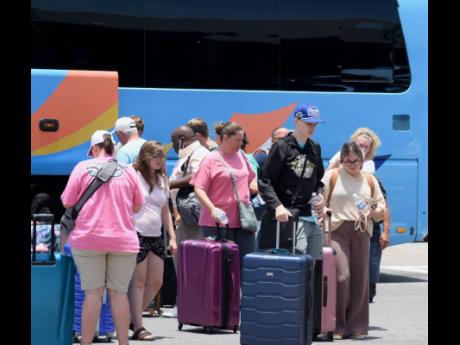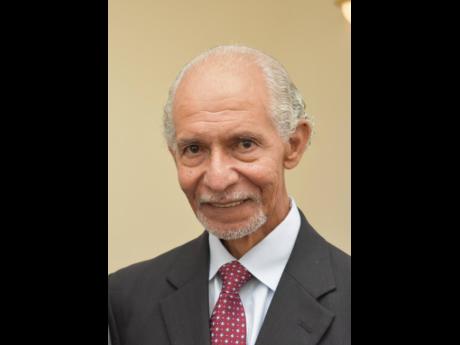Curtis Ward | Impact of tourism earnings vs diaspora remittances
Discussions on the contribution of tourism sector earnings vis-à-vis diaspora remittances to Jamaica’s economy continue to be topical, at least for members of the Jamaican diaspora who demand fulsome, meaningful engagement with the Jamaican Government. The tourism sector has a public advantage not because of the real impact, but because of the perceived impact. Tourism visibility, the luxurious facade and beautiful edifices along Jamaica’s pristine coastlines, the public relations attached to tourism promotions, including government resources dedicated to tourism development and promotion are all contributors to this perception.
The Gleaner editorial, ‘Tourism and production’ (May 6, 2024), provided opportunity for discussion of this issue. As stated, “Of equal, or even greater, significance is tourism’s financial contribution to the economy. In the last fiscal year, according to the minister, the tourism sector grossed US$4.38 billion, an increase of 9.6 per cent on the amount for 2022-23.”
Very impressive. But, most important to this discussion is the qualifier. “Mr Bartlett said that 40 per cent (US$1.752 billion, or over J$271 billion) of that income remained in Jamaica, meaning 40 cents out of every dollar earned by tourism is spent in the domestic economy or stays in Jamaican bank accounts (as opposed to the portion that goes to foreign goods and service providers) to keep the industry going.”
This means that 60 per cent of tourism earning leaves Jamaica. In fact, probably never entered the country in the first place. Why? Because many of the tourism products hotels, attractions, etc., are foreign-owned, and the owners deposit their revenues in foreign banks. That is, at the corporate home of these foreign entities. That is the reality of doing international business. The hotel owners are mostly multinational corporations.
The Gleaner editorial also referenced the fact that “While tourism’s gross earnings, US$4.38 billion, makes it Jamaica’s biggest earner of foreign exchange, Mr Bartlett’s estimate of a 40 per cent (US$1.75 billion) domestic retention places second, after remittances, as the sector with respect to direct circulation in the local economy. According to central bank data, Jamaicans abroad last year sent home US$3.1 billion, or 46 per cent more than tourism’s domestic retention.” This means 100% of every US dollar in diaspora remittances remains in Jamaica.
I do not believe gross tourism earnings should be included in the data to earn classification as “Jamaica’s biggest earner of foreign exchange”.
However, that “46 per cent more than tourism’s domestic retention” means that diaspora remittances expenditure in the Jamaican economy, amounts to US $1.35 billion more than that of tourism, plus remittances significant multiplier effect and impact on people’s lives. Repeat, diaspora remittances exceed tourism earnings retained in Jamaica by US $1.35 billion. Add to this cash margin are the in-kind contributions to schools (education institutions and students), healthcare facilities and volunteer medical services provided for free directly to thousands of Jamaicans annually, and material contributions to NGOs serving the poor and marginalized,
The tourism sector is a major contributor to Jamaica’s GDP, hence Jamaica’s economy, and by extension adds value to those whose lives are impacted, directly or indirectly. The tourism sector contributes to low-income employment for thousands of Jamaicans.
VULNERABLE
At the same time, we have also experienced how vulnerable the tourism sector is to external economic shocks, natural disasters, disease pandemics, travel boycotts, and travel advisories issued by major source countries. Most recently, we experienced the precipitous drop in tourism sector earnings during the COVID-19 pandemic and the contrasting concurrent, steady increase in and reliability of diaspora remittances. Arguably, at a period when tourism earnings collapsed, diaspora remittances saved the Jamaican economy from collapse.
The Jamaican Government and its agency the Bank of Jamaica crow about the record level of the national international reserves (NIR). The Government brags of the NIR record as a major economic accomplishment of the current administration. We often hear this declaration simultaneously with statements about record tourism earnings. Not much is being said about diaspora remittances contributions to the NIR. Nothing about the link between the growth in NIR and the steady, predictable flow of diaspora remittances. Far too many in Jamaica are not exposed to, or do not understand this connection. I should hope this is an inadvertent and not a deliberate government policy to silence the diaspora and keep the public in the dark, thereby justifying diaspora exclusion from influencing governance, and from impacting government policy and decision-making.
Tourism sector leaders exercise considerable influence over government policy and decision-making. The Government jumps when they speak. The Jamaican diaspora does not have such influence. Arguably, the diaspora is taken for granted, their voices are often ignored, and many, including the Government eschews diaspora advocacy. Sadly, there are many in the Jamaican public who argue against the diaspora having any influence over the quality of governance in Jamaica. I am not advocating for Jamaicans abroad to vote in Jamaica. I never have. But I have been consistent in supporting diaspora engagement in ways to have a meaningful impact on governance, including the right to criticise poor government performance, and the right to access the courts to hold the Government accountable for nonfeasance, misfeasance, or malfeasance.
There is a dearth of available, at least not publicised, data on the multiplier effect of remittances on the lives of the Jamaican people and the total economy. The GDP numbers are only the tip of the iceberg. The CAPRI 2017 report on remittances, issued on the margins of the 2017 Biennial Diaspora Conference, attempted to put this in perspective. But a lot more comprehensive studies are needed to fully inform the Jamaican people of the multiplier effect of diaspora remittances on the day to day lives of the Jamaican people. Data is available from school boards, school principals, and beneficiary students, from the ministry of health (assuming), small businesses – artisans, shopkeepers, and small farmers and fishers. The Customs bureau should also have useful data.
The absence of broad public dissemination of knowledge on the impact of diaspora remittances contributes to those often-misguided commentaries about diaspora reality and demands. Many unwittingly, mistakenly, dishonestly, or deliberately are quick to suggest that diaspora discontent is confined to a small segment of the diaspora. Thus, the diaspora can be ignored. There is a disconnect between perception and reality.
Curtis Ward is former ambassador of Jamaica to the United Nations with special responsibility for Security Council affairs. He is an attorney and international consultant on geopolitical and international security issues, and is an anti-corruption advocate. Send feedback to columns@gleanerjm.com.


